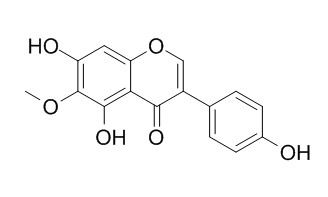Natural Products
Tectorigenin
| Catalog No. | CFN99920 |  |
| CAS No. | 548-77-6 | |
| Molecular Weight: | 300.26 | |
| Molecular Formula | C16H12O6 | |
| DBs | [PubChem]:274951034 [ChEMBL]:9429 [PCIDB]:2577 |
Standard InChI:
InChI=1S/C16H12O6/c1-21-16-11(18)6-12-13(15(16)20)14(19)10(7-22-12)8-2-4-9(17)5-3-8/h2-7,17-18,20H,1H3
Biological Activity
Tectorigenin (Tg) and tectoridin (Td) are the major compounds isolated from the rhizomes of iridaceous plant Belamcanda chinensis which is well known as a chinese traditional medicine for the treatment of inflammatory diseases; Tectorigenin inhibits IFN-γ/LPS-induced inflammatory responses in murine macrophage RAW 264.7 cells, it appears to have the potential to prevent inflammation.[1]
Tectorigenin and several other phytochemicals downregulate PDEF, PSA and IGF-1 receptor mRNA expression in vitro, the downregulation of PDEF, PSA, hTERT and IGF-1 receptor gene expression by tectorigenin demonstrates the antiproliferative potential of these agents, they might be new and established targets for therapies in prostate cancer.[2]
Tectorigenin and kaikasaponin III have hypoglycemic and hypolipidemic effects in the streptozotocin-induced diabetic rat and their antioxidant activity.[3]
Tectorigenin-paclitaxel-induces nuclear translocation of NFκB and the phosphorylation of IκB and IKK, suggests that tectorigenin could sensitize paclitaxel-resistant human ovarian cancer cells through inactivation of the Akt/IKK/IκB/NFκB signaling pathway, and promise a new intervention to chemosensitize paclitaxel-induced cytotoxicity in ovarian cancer.[4]
Tectorigenin has inhibitory effect of the activities of plasma ALT, the effects is much more potent than that of a commercially available dimethyl diphenyl bicarboxylate; Orally administered tectoridin shows hepatoprotective activity; tectorigenin also protects against the cytotoxicity of HepG2 cells induced by t-BHP, this protection may have originated from the inhibition of apoptosis; tectorigenin may be hepatoprotective and tectoridin should be a prodrug that is transformed to tectorigenin.[5]
Tectorigenin inhibits the in vitro proliferation and enhances miR-338* expression of pulmonary fibroblasts in rats with idiopathic pulmonary fibrosis.[6]
Product
References
[1] Pan C H, Kim E S, Sang H J, et al. Arch Pharm Res, 2008, 31(11):1447-56.
[2] Thelen P, Scharf J G, Burfeind P, et al. Carcinogenesis, 2005, 26(8):1360-7.
[3] Lee K T, Sohn I C, Dong H K, et al. Arch Pharm Res, 2000, 23(5):461-6.
[4] Genead R, Fischer H, Hussain A, et al. Carcinogenesis, 2012, 33(12):2488-98.
[5] Lee H U, Bae E A, Kim D H. J Pharmacol Sci, 2005, 97(97):541-4.
[6] Zhang H, Liu X, Shi C, et al. J Ethnopharmacol, 2010, 131(1):165-73.
[7] Zhao N, Liu D, Wang Y P, et al. J Pharm Practice, 2012, 3.
Product Use Citation





